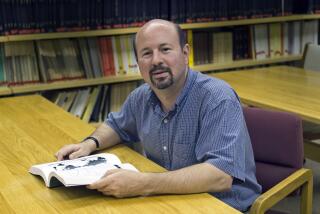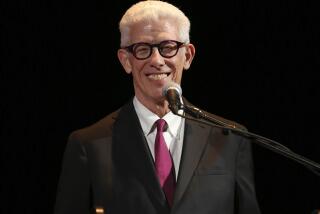Gerald Edelman dies at 84; Nobel-winner was ‘Darwin of nervous system’
Gerald Edelman, a co-winner of the Nobel Prize in 1972 who later joined the Scripps Research Institute in La Jolla and wrote books and numerous articles about the brain, the nervous system and consciousness that amazed and sometimes annoyed his scientific colleagues, has died. He was 84.
Edelman died May 17 at his home in La Jolla; he had Parkinson’s disease, according to his family.
“With Gerry’s passing, the world has lost an independent and creative thinker with a true passion for knowledge,” said Michael Marletta, president and chief executive of the Scripps Research Institute.
Along with Rodney Porter, a British scientist working independently, Edelman won the 1972 Nobel Prize for physiology or medicine for discoveries involving the chemical structure of antibodies, the immune system proteins that detect and destroy bacteria and viruses.
The findings of Edelman and Porter later proved key to the work of biotech firms looking to find ways to diagnose and cure cancer and other diseases.
Gerald Maurice Edelman was born July 1, 1929, in New York. His father was a doctor, and his mother worked in the insurance industry. As a youth he dreamed of becoming a concert violinist.
Switching his pursuit to science, he graduated from Ursinus College in Pennsylvania in 1950 and received a medical degree from the University of Pennsylvania in 1954. After serving in the Army medical corps, he received a doctorate from what is now the Rockefeller University and remained there to study antibodies.
By 1991, Edelman was director of the Neurosciences Institute, an independent center based at Rockefeller University. When it was announced that year that the institute would move to Scripps, it was considered a major scientific coup and a sign that the West Coast would soon rival the more established scientific centers of the East Coast.
To accommodate five research fellows and 17 scientists, Scripps built a 20,000-square-foot laboratory and office complex on its 20-acre campus. Edelman proudly called it a “monastery for science” and referred to his colleagues as poets.
In his decades-long association with Scripps, Edelman was a neurobiology professor, department chairman and member of the Skaggs Institute for Chemical Biology within Scripps.
Following the trail of other brain scientists, Edelman’s attention turned to unraveling the mystery of consciousness, which he felt evolved because of a person’s experience.
In 1990, Lee Dembart, a reviewer for The Times, wrote that he could “feel my brain spinning” after reading Edelman’s latest book, “The Remembered Present: A Biological Theory of Consciousness.”
“Edelman’s book is by turns lucid and opaque, which explains why he has been hailed and dismissed,” Dembart wrote. “There’s an awful lot going on there. I wish I knew what it was.”
Edelman’s books were often difficult to understand, even for fellow scientists. His apparent dismissive attitude toward other theories about consciousness and the brain made him a controversial figure in the competitive world of high-level science.
“Why does Gerald Edelman have so many enemies?” a reviewer wrote in London’s Guardian newspaper in 2004. The reviewer, John McCrone, the author of four books about the brain, described Edelman in his years in New York as “erudite, urbane, (and) rambustious” and noted that “Edelman does not hide the fact that he believes he has all the answers.”
Reduced to its essence, Edelman’s theory, called “neural Darwinism,” held that a person’s experiences shape and alter the brain in unique ways and that those alterations determine how the person will respond to future experiences. The theory seemed to contradict the more traditional view that the brain’s potential is determined at birth by its chemistry and physical structure.
McCrone wrote that to Edelman brains “are not hardwired machines but a vast mesh of loosely connected cells which can form fleeting coalitions. Like a crowd of eager hands, there are many ways a bunch of brain cells can combine.”
Oliver Sacks, the noted professor at New York University and author of best-selling books about the brain and consciousness, said Edelman’s theories about the nervous system were as revolutionary as Charles Darwin’s about evolution in the mid-19th century.
Edelman’s work about “how one became an individual (was) unlike anything that existed before,” Sacks said in a 2012 video. For a scientist, Sacks said, meeting Edelman was as exciting as it must have been to meet Darwin in 1854 when he was working on “On the Origin of Species.”
“He sees himself as the Darwin of the nervous system,” Sacks said of Edelman.
Edelman’s prose had a flair not often associated with scientific writings. Dembart picked out a particularly dashing paragraph in “The Remembered Present,” in which Edelman explains:
“Consciousness may be seen as the haughty and restless second cousin of morphology (brain structure). Memory is its mistress, perception its somewhat abused wife, logic its housekeeper, and language its poorly paid secretary.”
If Edelman was upset by the sometimes doubting reviews or the puzzlement of colleagues, he never let on. He delighted in dazzling interviewers with high-speed references to pop artist Andy Warhol and violin master Jascha Heifetz and jokes about Beethoven’s cat.
In 2004 Edelman was criticized by some scientists when it was revealed that he had been paid $700,000 over a decade by the tobacco company Philip Morris to act as a consultant. Edelman was working for an organization that “denied something that was an incontrovertible fact” — that smoking causes cancer — one medical professor said.
Edelman is survived by his wife, Maxine, sons Eric and David and a daughter, Judith.
More to Read
Start your day right
Sign up for Essential California for the L.A. Times biggest news, features and recommendations in your inbox six days a week.
You may occasionally receive promotional content from the Los Angeles Times.






